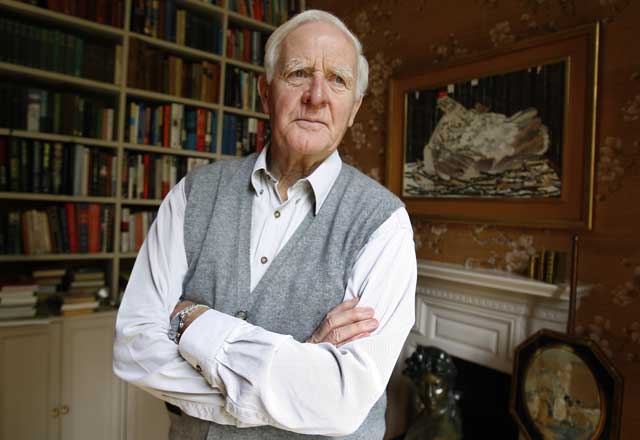Our Kind Of Traitor, By John Le Carré

Your support helps us to tell the story
From reproductive rights to climate change to Big Tech, The Independent is on the ground when the story is developing. Whether it's investigating the financials of Elon Musk's pro-Trump PAC or producing our latest documentary, 'The A Word', which shines a light on the American women fighting for reproductive rights, we know how important it is to parse out the facts from the messaging.
At such a critical moment in US history, we need reporters on the ground. Your donation allows us to keep sending journalists to speak to both sides of the story.
The Independent is trusted by Americans across the entire political spectrum. And unlike many other quality news outlets, we choose not to lock Americans out of our reporting and analysis with paywalls. We believe quality journalism should be available to everyone, paid for by those who can afford it.
Your support makes all the difference.Readers who scour the late, angry novels of John le Carré for the frisson of an undercover hit will enjoy, in his 22nd book, the party scene on a Russian criminal kingpin's yacht in the Adriatic. On the deck there stands, sometime in New Labour's dying days, a Shadow Minister "tipped for stratospheric office" after the election. Captured on a passing tourist's film soon confiscated by the British secret service, this up-and-coming golden boy takes his ease among the border-hopping super-rich, complete with his "haughty sub-Byronic gaze of sensual entitlement".
It's pure fiction, I assume. But that fiction – as in Le Carré's recent fables – finds in the vicious underside of the global free market an enemy more steeped in evil, more avid for what a nearly-heroic British agent calls "the profits of pain", than any simple military challenger lurking east of the pre-1989 Iron Curtain. In Our Kind of Traitor, Smiley and Karla's creator merges his old world with his new. Obliquely at first, then at an accelerating pace, the novel concocts a plot that roots Russian mafiosi - hand-in-glove with top-level British protectors - in the Soviet soil of the gulag, the nomenklatura and of a deep state (both in Moscow and in London) that changes its skin but never its soul.
We begin with a fractured descent into the underworld. On a tennis holiday in Antigua with his lawyer wife, an austerely left-wing "honourable schoolboy" - an Oxford English don - plays against a Russian man of mystery, Dima. This wise-cracking hulk has a fractious, complicated clan in tow. Soon Perry and Gail get to know bulkily affable Dima and his ramifying family. We trace that Caribbean encounter in fragmented retrospect, as this rather priggish couple undergo interrogation by the "Service" in London.
Bewitched by the "fair play" of an ideal English gentleman, Dima has chosen to trust Perry with his and his relatives' lives. This traumatised veteran of the gulag, and loyal member of Russia's vory gangster families, has risen to become money-launderer in chief for an alliance of seven brotherhoods. Now, at a ceremony in Switzerland, he must give way to another. That means death.
Hence the urgency of his need to defect and spill every bean about his "brothers" and clients alike, from Moscow to Paris, Berne and (above all) the City of London itself. For his part, Perry the activist for "Academics against Torture" stumbles step by step into the bowels of the secret state he once despised, led – quite plausibly – not by any abstract sense of duty but by the curiosity of "the slumbering romantic in him".
Banker-bashers will adore this book. Le Carré, always an intriguing blend of patrician and populist, gives voice to all our contempt for hot-money deals via Hector, the "maverick" senior agent. A foul-mouthed, high-principled curmudgeon, he takes on Dima as a freelance mission in the teeth of opposition from the trimming top brass on the "fourth floor". In classic Le Carré style, Hector the "turbulent contrarian" plays dirty in a noble cause. His "vendetta" against City evil-doers tries to enact "a brand of British patriotism... consistent with the contemporary conscience". Sidekick Luke, a Service hack in dire need of redemption, throws the reader another comforting life-line that snakes back into Le Carré's old terrain.
The plot thickens, and quickens. With Perry and Gail, innocents abroad but on board, Hector and Dima seal a deal at the French Open in Paris – almost under the eyes of the florid, reptilian fixers who marry Moscow cash with London power, such as the smoothie brief who acts as "walking legal loophole to the revoltingly rich". Sadly, Le Carré simply hates these guys too much to let them breathe on the page.
In a virtuoso finale amid the woods and peaks of the Bernese Oberland, he attempts to leaven boys'-own derring-do with Gail's tender friendship for Dima's troubled daughter, Natasha. Yet the lure of action, and intrigue, always pulls him back. Two of the closed worlds here throb with passion and vitality: Dima's vory fraternity, with its fealties and feuds, and the "Service" itself, torn as ever between "fair-play English gentlemen" and "perfidious Albion shits". Yet Le Carré fumbles with the City end of the vast laundry operation. Cartoon villains and broad brush-strokes suffice for him here. Next time, he should focus the lens of his righteous wrath more closely on the belly of the beast.
Join our commenting forum
Join thought-provoking conversations, follow other Independent readers and see their replies
Comments